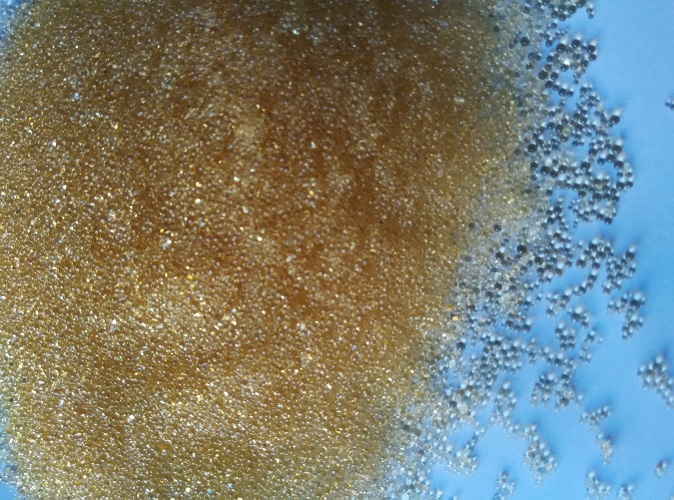成都森格尔环保科技有限公司
Chengdu senge environmental protection technology co.LTD
Consultation Hotline:02865357899
Production, Sales and Development of Ion Exchange Resin
成都森格尔环保科技有限公司
Chengdu senge environmental protection technology co.LTD
Consultation Hotline:02865357899
Production, Sales and Development of Ion Exchange Resin
Contact person: Manager Liu
Location: 028-65357899
Mobile phone: 15680686111
Mailbox: chengdu@sgrhb.com
Fax: 028-65357899
Email: chinaresin@sgrhb.com
Website: www.sgrhb.com
Website : en.sgrhb.com
Address: 79 Jiujin Street, Wuhou District, Chengdu City, Sichuan Province
Ion exchange resin failure control methods include:

1. Ion exchange resin is composed of classification name, skeleton (or gene) name and basic name. The pore structure is divided into two types: gel type and large pore type. All macroporous resins with physical pore structure are added "big hole" before the full name. If the classification is acidic, the word "yang" should be added before the name, while the classification is alkaline, and the word "yin" should be added before the name. Such as: macroporous strong acidic styrene cation exchange resin. Principle of Detection and Control
The adsorption order of strong acidic cation resins for various cations in water is: Fe ~ (3+), Al ~ (3+), Ca ~ (2+), Mg ~ (2+), Na ~+ ions, which indicates that the adsorption capacity of metal ions Na ~+ in water is the weakest. Therefore, when ion exchange occurs, the resin layer of each ion adsorption layer moves downward gradually, H+. When the protective layer penetrates, the first leakage is the lowest layer of Na+; therefore, monitoring the failure of the cation exchanger is based on sodium leakage. The reaction equation is (A is a metal cation, R is a resin group):
AN+NRH=RNA+NH+HCO 3-+H+=H_2+CO_2
The order of adsorption of various anions in water by acid resin is SO42-NO3-Cl-OH-HCO 3-HSiO 3-. It can be seen that the adsorption capacity of HSiO 3 - is the weakest. When ion exchange, the resin layer moves downward gradually, and OH-. In place of other anions, when the protective layer penetrates, the first layer leakage is the lowest layer of HSiO 3-so the monitoring of the failure of the anion exchange layer is based on silicon leakage, and the reaction equation is as follows:
BM-+mROH=RMB+Moh-
2. Control Point and Control Method
Because bus control system contains unit system, it has the advantages of making full use of resin, increasing heat exchanger outlet capacity and reducing acid and alkali consumption. Ion exchange resin is composed of classification name, skeleton (or gene) name and basic name. The pore structure is divided into two types: gel type and large pore type. All macroporous resins with physical pore structure are added "big hole" before the full name. If the classification is acidic, the word "yang" should be added before the name, while the classification is alkaline, and the word "yin" should be added before the name. Such as: macroporous strong acidic styrene cation exchange resin. This paper mainly discusses the ion exchange desalination system based on this structure.
(1) The removal rate of organic solute by RO is higher than that by NF membrane. Ion exchange resin is composed of classification name, skeleton (or gene) name and basic name. The pore structure is divided into two types: gel type and large pore type. All macroporous resins with physical pore structure are added "big hole" before the full name. If the classification is acidic, the word "yang" should be added before the name, while the classification is alkaline, and the word "yin" should be added before the name. Such as: macroporous strong acidic styrene cation exchange resin. Different organic solute pairs
(2) The removal rates of acetic acid are different, and some even have great differences (for example, the absorbance removal rates of acetic acid by reverse osmosis membrane and nanofiltration membrane are 95.34% and 81.45%, respectively). The absorbance removal rates of aniline were 61.50% and 46.82% respectively.
Desalting with a first-stage composite bed, the conductivity (25 C) is less than 10 ugs/cm, and the silicon content in water is less than 100 ug/L.
Ion exchange resins are widely used in medicine, coatings, chemical industry and other fields. Electronics and other fields are mainly used in the field of high-pressure boiler feed water, as well as the preparation of pure water and ultra-pure water.
Chengdu Senger Environmental Technology Co., Ltd.
Record No: 蜀ICP备19000327号
Powered by Xiangyun Platform
Contact person: Manager Liu
Location: 028-65357899
Mobile phone: 15680686111
Email: chinaresin@sgrhb.com

